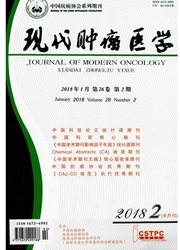

 中文摘要:
中文摘要:
目的:观察p53基因治疗药物“今又生”对晚期恶性肿瘤患者的临床疗效。方法:自2004年5月到2005年6月,用静脉滴注、肿瘤局部注射等方法共治疗晚期肿瘤患者23例。其中10例单用“今又生”进行基因治疗,13例接受“今又生”治疗并联合化疗。用CT观察肿瘤大小改变,卡氏评分评估体力状态的变化,综合评估患者的临床受益。结果:单用”今又生”治疗的患者,无CR患者,PR3例(30%),SD4例(40%),PD3例(30%),该组的临床获益率为70%。接受“今又生”和化疗组,无CR患者,PR6例(46.2%),SD4例(30.8%),PD3例(23.1%),该组的临床获益率为76.9%。“今又生”治疗后总的临床获益率为72.7%。两组的卡氏评分平均提高〉10分。“今又生”对头颈部癌,肺癌,胰腺癌及胃癌均显示出较好疗效。未观察到与“今又生”相关的严重副反应。结论:“今又生”的应用能让晚期恶性肿瘤患者临床获益同时无严重并发症。
 英文摘要:
英文摘要:
Objective:To evaluate the efficacy and toxicity of recombinant adenovirus p53 injection (Gendicine) in patients with advanced cancer. Methods: From august 2004 to June 2005, we treated 23 advanced cancer patients with Gendicine by methods of intravenous drip, intratumoral injection. 10 patients were treated by Gendicine gene therpy only; other 13 patients were treated by Gendicine combined with chemotherapy. According to WHO criteria, we judged the curative effect by using CT to compare the change in tumor size; and evaluated clinical benefit response by change of Karnofsky Peformance Score. Results: The 10 patients treated by Gendicine only revealed partial response (3 of 10 patients, 30% ) , stable disease (4 of 10 patients, 40% ), progressive disease (3 of 10 patients, 30% ). Total clinical benefit response was 70%. The other 13 patients treated by Gendicine combined with chemotherapy revealed partial response (6 of 13 patients, 46.2% ), stable disease (4 of 13 patients, 30.8% ), progressive disease (3 of 13 patients, 23.1% ). Karnofsky Peformance Score average of two groups were increased over 10. Total clinical benefit response was 76.9%. In patients treated with Gendicine there was no severe side effect. Conclusion: Both gendicine and combined with chemotherapy are effective and safe to most patients with advanced cancer.
 同期刊论文项目
同期刊论文项目
 同项目期刊论文
同项目期刊论文
 期刊信息
期刊信息
